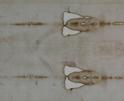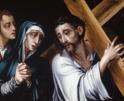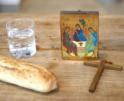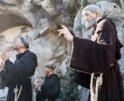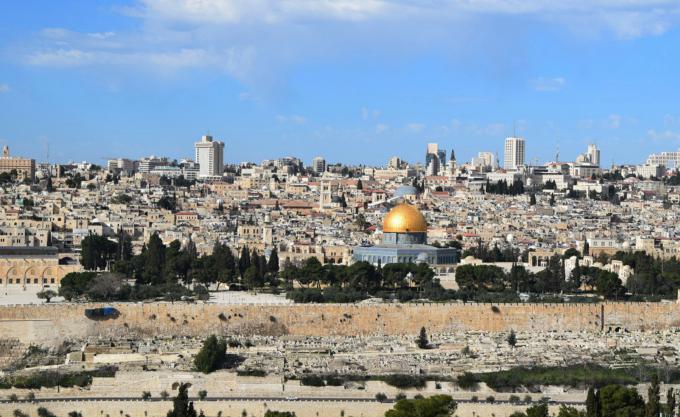
Spirituality
... you may wish to take advantage of the relatively quiet weeks now to begin planning, for yourself or for a loved one, a trip to the Holy Land when the "winter" of COVID-19 has passed.
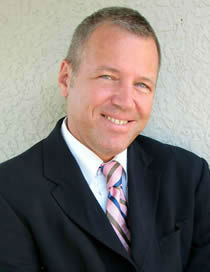
Pakaluk
''A man doesn't know what he has until he loses it," sings Joe Boyd, the middle-aged real estate salesman in the musical "Damn Yankees." Transformed into a young, superstar athlete -- "Shoeless Joe from Hannibal, Mo" -- through a pact with the devil, he realizes finally how precious was the love of his faithful wife, which he had taken for granted, and has now lost.
Christianity is supposed to be proof against taking things for granted. In baptism, we die with Christ to receive our new life back as a free gift. We relive the death of Christ in the stations of the cross and Passion week. The rhythm of moving from "all is lost" to "everything and more is regained" is built into our liturgical year (as in the plot of "Damn Yankees," too). No one, then, should live life more intensely than a Christian. No one should be more liberated from "mere routine."
That's how grace works in us -- if we are open to it. And therefore we can expect -- absence makes the heart grow fonder -- that one fruit of the COVID-19 lock-downs will be that Catholics will come to love more intensely what they have been taking for granted.
And yes, we have been taking it for granted: only 30 percent of Catholics, the polls say, were even going to Mass regularly. Now Masses are closed and Holy Communion is practically impossible. Let's pray that Catholics will emerge from all this with something of the zeal of the Martyrs of Abitine, who famously exclaimed, "Sine dominico non possumus" ("We cannot live without the Eucharist").
I had something of a Joe Boyd experience (as one might call it), which I want to share with you, when I returned from a pilgrimage to the Holy Land in early March. Just four days after I got back, Israel sealed its border and told pilgrims already there to evacuate. Going forward, the Holy Land will be inaccessible for weeks, if not months. I was among the last pilgrims.
When the Israeli government made its decision, I finally realized -- the Holy Land has been inaccessible like that for most centuries in the history of Christendom. Occupation of the holy sites by Romans or non-Christians hostile to Christianity; the danger of travel; the great expense of travel; the time required to travel -- all of these made a pilgrimage to the Holy Land, as a rule, out of reach for Catholics. They yearned for it, but they could not do it.
In recent decades, in contrast, travel there has been no more problematic than travel to Europe. But how many of us even think of this? We can do it, but we have not yearned for it. We have taken it for granted.
If you see my logic and agree with what I am getting at, you may wish to take advantage of the relatively quiet weeks now to begin planning, for yourself or for a loved one, a trip to the Holy Land when the "winter" of COVID-19 has passed.
There are many good pilgrimages, and often one's pastor is open to organizing a trip. But I want to recommend, especially for someone in the 25-40 age group and who counts as a "young professional," the "Saxum YPS" program which I participated in as an adviser. Founded just last year by Barbara Pereira, a retired global banking executive at J.P. Morgan, and Joseangel Dominguez, a professor of biblical studies at the Polis center in Jerusalem, in its first year it brought together some 35 young professionals from 15 countries for a 10-day pilgrimage to such sites as Nazareth, Mount Tabor, Capernaum on the Sea of Galilee, the River Jordan, Bethlehem, and Jerusalem. Its next trip is planned for early November.
Saxum YPS is distinctive through two different "embeddings," one might call it. The first is the embedding, within the pilgrimage, of visits to businesses in the Holy Land: we visited, for instance, a medical technology company in Nazareth which manufactures the world-leading devices for guiding the precise insertion of electronic probes into the brain; and a tech start-up in Tel-Aviv which developed an app for agricultural business to make use of big data.
The rationale for such visits? Because the Holy Land is the heritage of Christians, Pereira explained: "With the population of Christians in the area declining, it's important to know this and become involved with it. By forming friendships with persons in that region, we can better understand our heritage."
The other embedding is of the pilgrimage itself within one's relationships and life. The bonds which the participants form are meant to be life-changing -- and they are. And then this 10-day pilgrimage to specific holy sites is meant to illuminate one's entire life, understood as a pilgrimage.
And that's something none of us can afford to take for granted, really -- that we are pilgrims in this life. Saxum YPS was founded on the conviction that it's best, if possible, to see this truth at the start of one's adult life, not at the end, when the opportunity to live one's life as a pilgrim may be "lost."
If practically speaking a trip to the Holy Land seems impossible to you, then, why not, like our brothers and sisters in past years -- yearn to go? And pray, as it's likely that the persistent prayer to go will already mark you as a pilgrim.
- Michael Pakaluk is Professor of Ethics and Social Philosophy in the Busch School of Business at The Catholic University of America. His book on the gospel of Mark, "The Memoirs of St. Peter," is available from Regnery Gateway.
Recent articles in the Spirituality section
-
He saw the cloths and believedBishop Robert Barron
-
God's instrument for viewing the crucifixionMichael Pakaluk
-
QuinquagesimaMichael Pakaluk
-
Pro-life Christians: Now is the time to shout from the rooftopsBishop Robert Barron
-
Seeking an indulgence as an act of faithMichael Pakaluk

